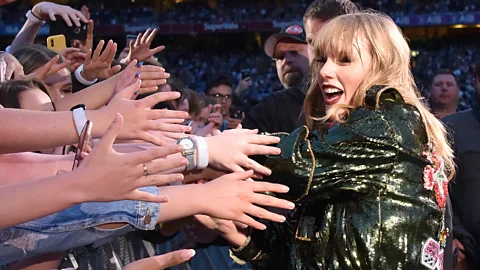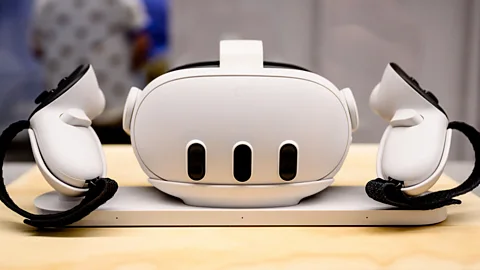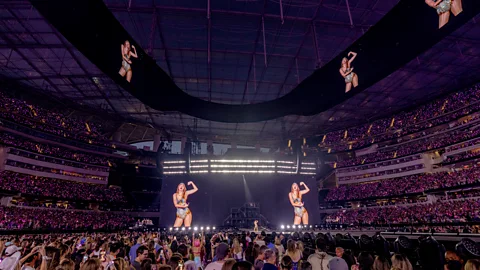Taylor Swift could be the push the VR industry needs
 Getty Images
Getty ImagesAs virtual reality companies hunt for ways to spread their tech, they may find an unexpected audience for wide-scale adoption: Swifties.
The unprecedented popularity of Taylor Swift's Eras Tour has inspired fans to spend thousands on tickets, while its cinematic debut broke box office records. Now, some experts in the virtual reality (VR) space are hopeful it will also inspire her fans – "Swifties" – to adopt the immersive technology platform.
Along with stadiums and cinemas across the globe, The Eras Tour is also streaming on Amazon's Prime Video app. Soon after its release fans discovered that, like much of Prime Video's content library, they could stream the film in their own private virtual theatres through Prime Video's VR app on a Meta Quest.
On TikTok and other social media platforms, videos of Swifties singing along while wearing the headsets have gone viral. This has led some industry insiders to suggest the cinematic experience of the top grossing tour in music history could also catalyse the mass adoption they've been clawing for.
Widespread VR adoption, up to this point, has struggled. VR headsets began to pop up in arcades in the early '90s, but early attempts at a mass-market product failed. A 2022 Deloitte survey showed roughly 12% of American and 8% of UK respondents owned a VR headset.
 Getty Images
Getty ImagesTechnological limitations have fed into this slow uptake, but prohibitively high costs have also been a major factor. It wasn't until 2016 when the Facebook-acquired Oculus Rift became the first commercially-viable VR product, hitting store shelves at $600 (£470). Prices have since come down: the mixed-reality headset Meta Quest 3, released in October 2023, is priced at $499 (£391); its predecessor, the Meta Quest 2, is widely available at $249 (£198). (Other VR headsets are still extremely expensive: Apple's Vision Pro, launching February, begins at $3,499 (£2,741).)
Typically, the cost of attending a concert is a fraction of a new piece of hardware, but the Eras Tour has flipped that equation on its head. With resale tickets averaging more than $3,800 (£2,977) each, VR-industry insiders say there's reason to believe Swift's unprecedented popularity could finally provide an answer to the barriers of both content and cost.
"Buying a VR headset for $400 might sound unreasonably high, but if you think about buying it as an alternative to experiencing a Taylor Swift concert… $400 sounds like a reasonable alternative,” says Rolf Illenberger, the CEO Munich-based VRdirect, which helps organisations create virtual experiences. "The price point for a Taylor Swift fan is not a limiting factor to watch the superstar over and over again in this immersive experience."
Now that VR headsets are more functional and affordable, many in the field believe the main missing ingredient is a piece of software or content so popular it inspires the average person to purchase a new hardware device.
"Taylor Swift is a killer app for virtual reality," says VR expert and unabashed Swiftie Tom Emrich, who was ecstatic to see his two passions collide on social media over the holidays. "It was a big signal to me, and really reaffirmed that powerful IP is a necessary ingredient to attract folks to a brand-new device category."
Emrich, 45, who serves as the director of product and augmented reality platforms for San Francisco-based Niantic Labs – the company that brought the world Pokémon Go – notes that The Eras Tour Concert Film was filmed in 2D, not VR with cameras. Instead of immersing fans in a concert experience that makes them feel like they're sitting front row, he says the experience is more like being immersed in a movie theatre, with the Eras Tour film playing on screen.
"That's just the base level experience that you're going to be able to get in virtual reality," he says. Simply, this means content will only get better as events are captured using 3D filming technology – such as a 2023 Megan Thee Stallion concert experience, or an upcoming Doja Cat event – which were designed to make fans feel like they're standing on stage next to their favourite artist.
 Getty Images
Getty Images"I'm really excited for Swifties to eventually be able to experience Taylor Swift concerts made for VR," says Emrich. He adds that no such project has been confirmed, but says he remains optimistic one will emerge, given how excited fans were to watch the 2D version in VR.
The industry has tried to spark mass adoption through entertainment before. In recent years, live sporting events in VR have been met with similar excitement, but ultimately little uptake. In March 2023, for example, ESPN shared a TikTok video of a fan enjoying a courtside perspective of a live National Basketball Association (NBA) game from their living room. Despite racking up more than four million views and more than 330,000 likes on TikTok alone, it did not trigger mass adoption among sports fans.
Illinberger, however, argues that concerts are better suited to the medium. That's because, unlike a live sporting event, they can be edited and touched up with CGI after filming to enhance the viewer experience. Plus, sporting events are filled with stops and starts, during which time fans often chat with each other, use other devices, eat and drink or use the toilet, none of which is convenient with a headset on.
"For concerts like Taylor Swift… it comes back to immersive-ness," he says. "The Taylor Swift fan wants to experience the concert as much as possible, and that's what VR can deliver."
Update 16 Jan 23: This article has been updated to correct an error about the release date of the Meta Quest 3 and the price of the Meta Quest 2
